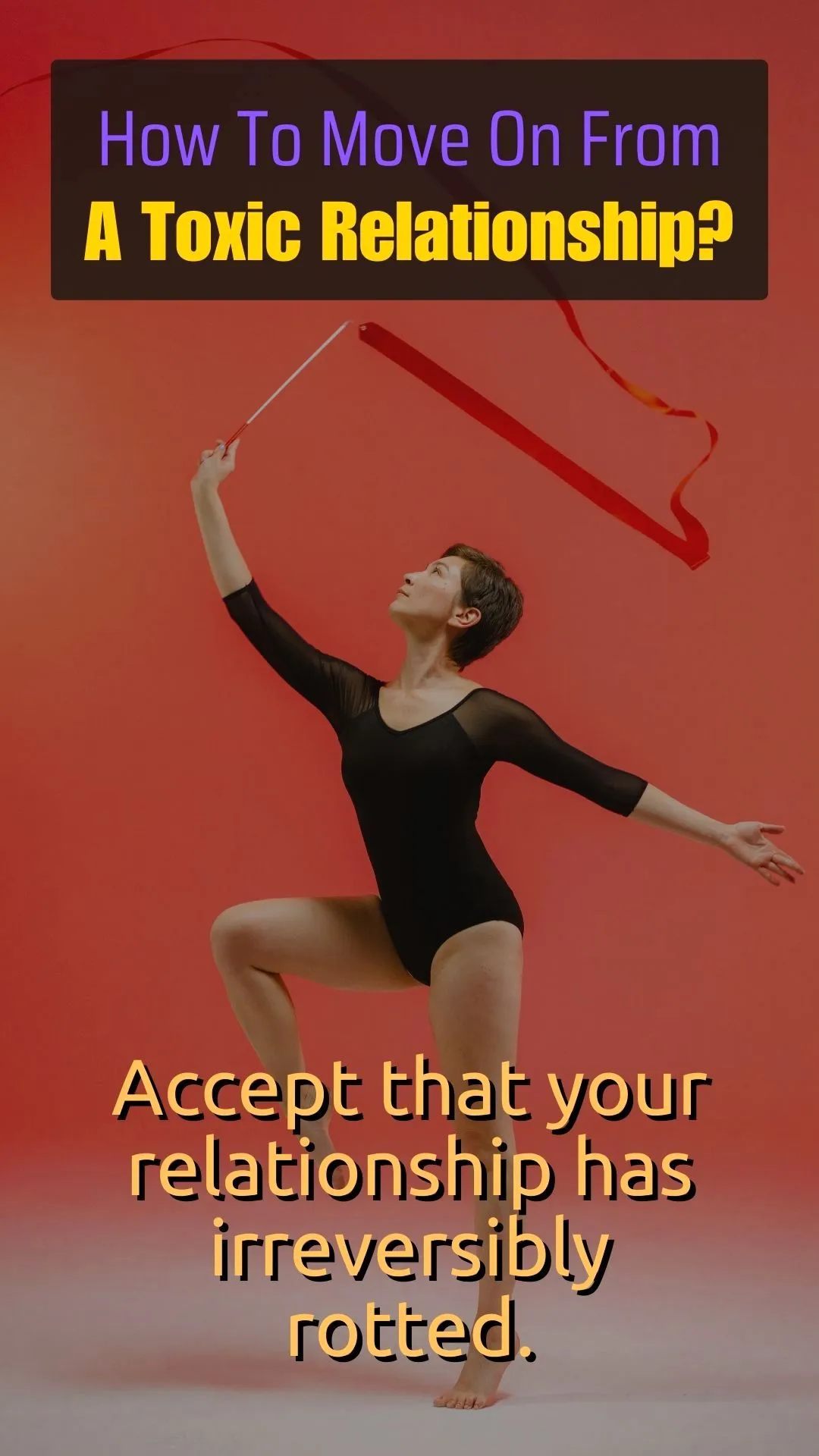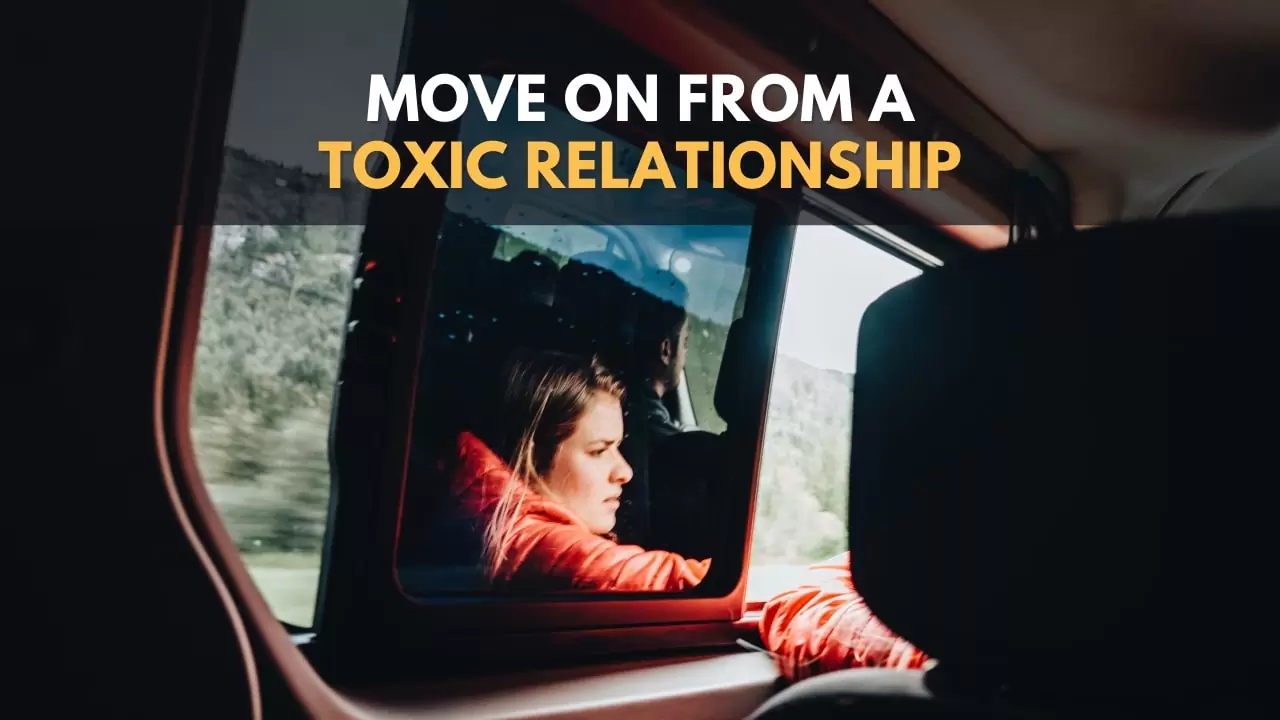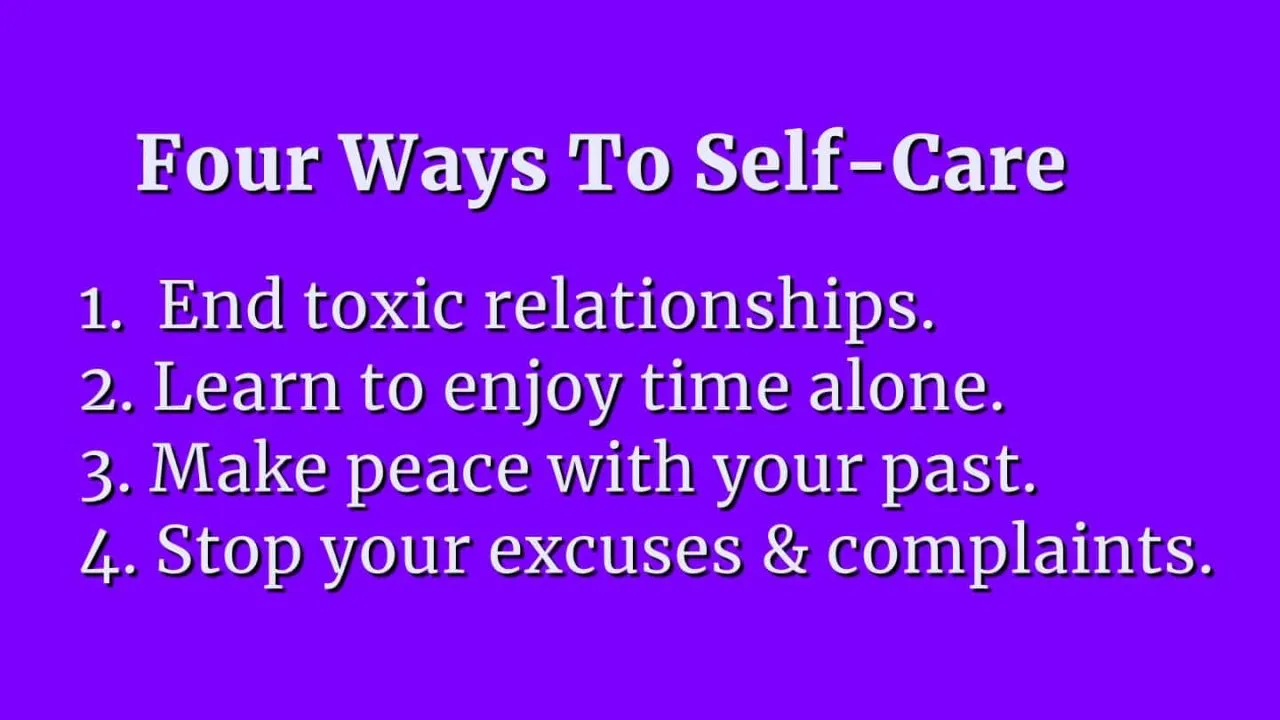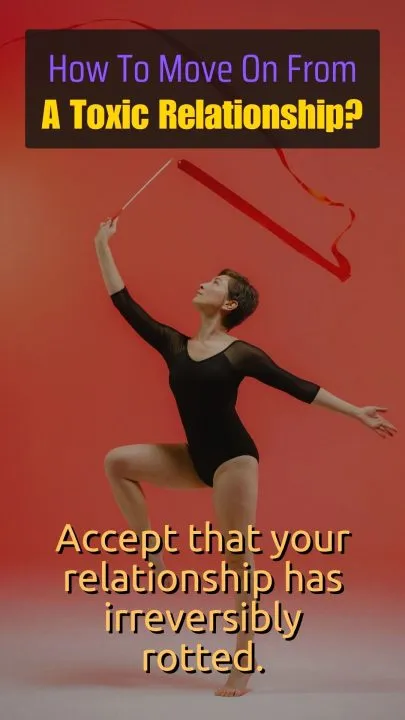Reading time: 9 minutes
— Reviewed by Dr. Sandip Roy.Toxic relationships are obvious. But if you aren’t sure, check if yours has more stress and fights and rare moments of peace and friendship.
Breaking up is the hardest part of a relationship, but also the most necessary part if it has turned toxic.
Know this: If you ever considered leaving a relationship, it means you have already made up your mind. You haven’t accepted it yet.
What keeps you from walking away are these:
- Past: Happy memories.
- Present: Fear of sudden loneliness and losing support.
- Future: Exhaustion of investing emotionally in a new relationship.
Then, how to move on from such a relationship?
How To Move On From A Toxic Relationship?
When your relationship is irreparably toxic, what can you do to get out of it, heal yourself, and put your life back on track?
Here are the seven steps to move on from a toxic relationship:

1. Recognize & Accept The Toxicity
Recognizing that your toxic relationship is beyond repair is easy, but accepting it isn’t.
We hang on to our hopes. We think that things will improve with time and patience. That our partner will change when they realize their mistakes. Or that we can adjust to their behavior.
However, this rarely happens. As time passes, our frustration and bitterness grow.
We become more reactive, angry, or tearful. Unaware that this further enables their toxicity and harms our well-being.
Try viewing your relationship from an outsider’s perspective. It can show you how your thoughts, instincts, and behaviors have been affected.
You might notice that:
- you’ve become unkind or impatient with others—traits you never had before, or
- you are constantly in survival mode — always on guard for the next insult or abuse.
Consider this: Sarah’s partner constantly criticized her choices and minimized her achievements. At first, she thought it was just “tough love.” But then she realized her self-esteem was at its lowest within one year of this relationship.
She realized this only when she saw her relationship objectively. The toxic pattern was too obvious, and she accepted that it wasn’t ever likely to change.
What to do:
- Take some time to reflect.
- Talk to someone who cares about you.
- Then, make the difficult but necessary decision to cut ties with the toxic person
A healthy relationship should uplift you, not drain you. If you don’t accept the reality early, especially in narcissistic relationships, your partner may trap you in a state of learned helplessness.

2. Stop Tolerating Their Toxic Behavior
The next is to stop tolerating them. Our tolerance makes them more uncaring and cruel. They do worse things.
Many of us struggle with this step.
We make excuses for their behavior or blame ourselves. We fall back on thinking, “If I just try harder, things will get better.”
But this keeps you trapped in the cycle of abuse. And lead to where you feel powerless to change your situation. Even stop dreaming of happier days.
Consider Mark’s story: His partner frequently belittled him in public, calling it “just joking around.” Mark laughed it off, not wanting to seem oversensitive. But each “joke” chipped away at his self-confidence, until he barely recognized himself.
It wasn’t until a friend pointed out how uncomfortable these interactions made others that Mark realized he needed to stop tolerating this behavior.
You deserve respect and kindness in your relationship. If you’re not getting them despite your efforts, prepare to walk away.
What to do:
- Write down specific behaviors you will no longer tolerate.
- Communicate your boundaries clearly and firmly to your partner.
- Follow through with consequences if they violate your boundaries.
By refusing to tolerate toxic behavior, you’re standing up for yourself and creating the possibility for healthier relationships in the future. It’s not about changing your partner—it’s about changing what you’re willing to accept in your life.
Reach out to friends, family, or a therapist whenever you feel the need to get an unbiased opinion.
3. Let Go of Any Hope For Change
Accepting that we cannot control everything allows us to:
— Radical Acceptance, Tara Brach, 2003
- cope better with life,
- let go of little anxieties, and
- move on from adversity more quickly.
It’s natural to hope things will improve. But hoping someone else will change their behavior because of you can make your fears and frustrations worse.
In toxic relationships, we often neglect self-care and stop giving ourselves the necessary self-love and compassion. We blame ourselves for the relationship’s problems, feeling like a victim and getting stuck in negative thought patterns.
Imagine Rebecca, who stayed in a toxic relationship for years, always believing her partner would change. She constantly made excuses for his hurtful behavior, thinking, “If I just try harder, things will get better.” This hope kept Rebecca from seeing the reality of her situation and sacrificing her mental well-being.
Often in life, our negative experiences shape who we become. They can leave lasting scars on our psyche, personality, and future relationships.
What to do:
- Acknowledge that you can’t force someone to change for you.
- Focus on your growth and goals. Learn to enjoy solitude.
- Practice self-compassion for your difficult emotions.
- Set realistic expectations for future relationships.
Recognize the world for what it truly is—filled with uncertainty and unpredictability. It can let you find peace within the chaos.
4. You Don’t Have To Do It Alone
Please assure yourself that you’re not alone in your struggle. Many people are in similar situations. This can encourage you to talk to other people, seek therapy, and ask for support.
As it is, today’s fast-paced life makes us neglect self-reflection and self-care. The constant pressure to “do it all” makes us feel unaccomplished and overwhelmed, especially in our relationships.
Consider Maria, She felt trapped. But was ashamed to discuss her toxic relationship with anyone. She thought she was the only one experiencing these issues and tried to handle everything on her own. Her isolation only made her situation worse until she finally opened up to a friend and realized many others had gone through similar experiences.
What to do:
- Reach out to trusted friends or family members for emotional support.
- For insights, join support groups for people leaving toxic relationships.
- Consider speaking with a therapist or counselor to learn coping strategies.
- Read books or articles about toxic relationships to understand you’re not alone.
Seeking help is not a sign of weakness but a step towards healing.
5. Prioritize Self-care While Leaving a Toxic Relationship
“Living well does not mean the abuse never happened. It means the abuse did not damage you beyond repair.”
— Shannon Thomas, Healing from Hidden Abuse
Leaving a toxic relationship can be as painful and raw as grieving the loss of a loved one. It needs a lot of time, patience, and self-care.
This step is not just about pampering yourself; it’s about rebuilding your strength and resilience to handle the challenges ahead.

For example, consider Alexa, who was preparing to leave a long-term toxic relationship. She set aside 30 minutes each day to do things that brought her joy and peace — listening to podcasts, meditating, and going for walks. This helped her build the emotional strength to solidify her decision to leave.
What to do:
- Design a daily routine that includes activities you enjoy.
- Practice mindfulness meditation to manage stress and apprehensions.
- Make it a point to do physical exercise to boost your mood and energy.
- Make sure you’re getting adequate sleep and maintaining a healthy diet.
Self-care isn’t selfish — you’re tending to your neglected needs and loves. Treat yourself with the same kindness that you give to your best friend.
6. Let Yourself Find Love Again
Relationships end for many reasons — infidelity, irreconcilable differences, personality clashes, or toxic behavior.
Many people, after leaving a toxic relationship, grapple with questions like: “What went wrong?”, “How do I move on?”, and “Will I ever be able to trust someone again?”
Addressing them is part of the healing process. The answers open up an opportunity for new beginnings. Learning to find love again is a test of rebuilding your ability to trust.
For instance, consider Sarah, who left a toxic relationship after years of emotional manipulation. She spent months focusing on self-care and personal growth before even thinking of dating again. When she did start dating, she took it slow. She set clear boundaries and paid close attention to how the person treated her and others.
What to do:
- Take time to heal: Don’t rush into a new relationship before you’ve processed your past experiences.
- Reflect on lessons: Spot the red flags you may have missed. List what you truly want in a partner.
- Set healthy boundaries: Be clear about your needs and expectations in future relationships.
- Trust your instincts: Pay attention to how they make you feel. Don’t ignore their red flags.
- Take it slow: When you start dating again, allow relationships to develop gradually.
Finding love after a toxic relationship is possible, you just have to give yourself a chance. Every experience can teach us something about ourselves and what we need in a healthy relationship.
7. Get Professional Help To Redesign Your Life
Taking care of yourself is an important step towards staying healthy, both mentally and physically.
What to do:
- Engage someone to redecorate your living space to create a fresh environment free from reminders of your ex.
- Pick up an activity that makes you feel confident and worthy — learn a new language, play a musical instrument, take dance lessons, volunteer for a cause you care about, or go solo traveling.
- Join support groups or online communities for people recovering from toxic relationships to share experiences and gain encouragement.
- Seek professional help through therapy or counseling to process your emotions and gain clarity.
Final Words
The bad thing about moving on from a toxic relationship is that you might want to go back to them after a while. Even worse is when they won’t let you go.
Do the following after a breakup to prevent going back to them:
- Block their number and remove them from all social media.
- Create a “no contact” rule for yourself and stick to it, no matter how tempted you feel.
- Surround yourself with supportive people who remind you why the breakup was necessary.
√ Also Read: 10 Early Signs Of A Toxic Relationship: Spot The Red Flags
√ Please spread the word if you found this helpful.
• Our Story!
